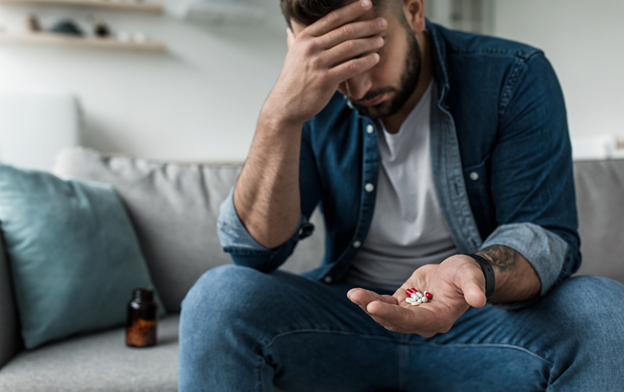Ever wondered if you could break free from drugs without checking into rehab? The answer might surprise you – yes, it’s possible. However, quitting drugs is tough from the get-go, and the longer you’ve been dependent, the tougher it gets. At a certain point, trying to quit alone isn’t just difficult but can also pose serious risks.
According to recent statistics, out of over 20 million Americans who have substance use disorder, only 10% receive treatment. Due to stigma, cost, or personal choice, many individuals seek alternative paths to recovery. This article examines ways to get sober without traditional rehab while considering the potential dangers of quitting substance use on your own.

How to Get Sober Without Rehab?
If you plan to go on a journey to sobriety without professional help, you must be ready with a plan. Take into consideration factors like withdrawal symptoms, health risks, and support systems.
It’s a journey that’s challenging yet possible with the right approach and support.
Acknowledge the Problem
Before you can take further steps, you have to admit and accept that you have a drug dependence problem. Getting sober without rehab often begins with a deep commitment to change and a clear understanding of the challenges ahead.
Set Clear Goals
Set clear, realistic goals. Writing down your reasons for quitting can serve as a tangible reminder of your commitment. Decide whether you’ll quit cold turkey or gradually reduce your drug use—it’s about finding what works best for you and knowing when to seek guidance from a medical professional.
Educate Yourself
Take some time to learn more about your substance of choice. Understanding their effects, especially long-term, can be a strong motivator to quit. Learn about the physical and psychological challenges, as well as withdrawal symptoms, to better prepare yourself mentally for the journey ahead.
Build Your Support System
Tell your family and friends about your decision to quit. Their support can be invaluable. They can provide encouragement, keep you accountable, and help you stay focused on your goals.
Make a Detailed Plan
Having a detailed plan for quitting will help you stay on track. You can include the date you’ll start, strategies to cope with cravings, and ways to avoid and/or manage triggers.
Steer Clear of Triggers
This is an important aspect when quitting drugs. First of all, identify your triggers – from people around you who encourage drug use to situations that make you crave drugs. Make changes to your routine to reduce the chances of encountering these triggers.
Healthy Lifestyle
Adopt a healthier lifestyle to help support and sustain your recovery. You can include regular exercise, meditation, a nutritious diet, and good sleep.
Keep Yourself Busy
Find new hobbies and activities to keep you physically and mentally engaged. You can try to take up some sports, do some reading, or other creative pursuits. This helps reduce the temptation of drug use.
Seek Help
Overcoming addiction requires professional guidance, medical support, and emotional and peer support. Professional guidance provides personalized strategies and medical support to manage withdrawal symptoms safely. Emotional and peer support from therapists and support groups play crucial roles in addressing underlying issues and maintaining motivation. This holistic approach not only increases the likelihood of successful recovery but also equips individuals with the tools and skills needed for long-term sobriety.
Plan for Relapses
Relapse is a common part of the recovery process so don’t get discouraged if it happens. Identify what triggered your relapse and make the necessary changes to your recovery plan.
Stay Committed
Always remind yourself why you want to quit and keep in mind the benefits of staying drug-free. Make sure to celebrate every victory along the way, no matter how small.

Reasons People Don’t Seek Professional Treatment for Substance Use Disorder
Professional rehabilitation centers have treatment strategies to help provide a safe and effective way for people to quit substance misuse. Still, there are many people who avoid seeking professional help.
Treatment barriers involve several factors. It’s important to understand these reasons or barriers in order to effectively encourage people to seek the help they need.
Personal Factors
- Denial. Many people fail to recognize or refuse to acknowledge that they have a substance use problem. Because they don’t see the problem, they do not see the need to seek help.
- Shame. There remains a strong stigma associated with substance use disorders. Stigma leads to fear of judgment and negative labels from other people. This often deters people from seeking help.
- Legal Consequences. There are a number of laws governing the use of illegal substances or the misuse of legal ones. Because of this, many refuse to seek professional help for fear of the legal repercussions.
- Lack of Awareness. Unfortunately, there are those who are unaware of the treatment options available to them. Some may not also understand how professional help can benefit them, especially in the long term.
- Fear of Withdrawal. Withdrawal is often painful and hard to manage. Just the fear of experiencing the withdrawal symptoms can keep individuals from seeking treatment.
- Mental Health Issues. People with substance use disorder often have co-occurring mental health disorders. This can make it harder for them to seek help.
Social Factors
- Social Support. Lack of support from family and friends can discourage people from having professional help. Also, if those around them are involved in substance use, they might give in to peer pressure and avoid treatment altogether.
- Cultural Beliefs. In some cultures, substance use may not be seen as a medical issue. Cultural beliefs and attitudes can influence someone’s willingness to seek treatment.
- Responsibilities. Some people may avoid treatment due to their work, family, and other responsibilities. This is especially true if there’s a fear of losing their job and being unable to support their family.
Systemic Factors
- Access to Treatment. In many rural and underserved areas, limited access to treatment facilities is a significant barrier. This includes long waiting lists, lack of transportation, and limited availability of service.
- Cost of Treatment. Treatment costs can be prohibitive for many people. This is especially true if they lack insurance or have inadequate insurance coverage.
- Quality of Care. Some do not seek treatment because of concerns about the quality of available treatment options. Past negative experiences with the healthcare system could also weigh in.
- Confidentiality Concerns. Worries about confidentiality can prevent some people from seeking treatment. They are often concerned that their substance use would be disclosed to their employers, family, or other people.
Why Rehabilitation is Important
Recovering alone is not only difficult and risky, but it can also be a lonely process. Rehabilitation can provide you with the necessary tools for successful recovery. On top of that, rehab can provide a supportive environment that can help promote long-lasting sobriety.
Safe Environment
Rehab centers can provide a safe and structured environment for people recovering from substance dependence. This keeps patients away from negative influences and various triggers that might lead to drug use.
Medical Support
Depending on the length and severity of dependence and the substance involved, the withdrawal symptoms can be severe and dangerous. Rehabilitation centers have a team of healthcare professionals that can provide proper treatment and care. They help in managing symptoms safely and comfortably.
Professional Therapy
Rehab and treatment facilities usually provide therapy sessions and counseling with trained professionals. Therapists can assess the issue and help you understand the root causes of your substance dependence. You will also learn how to effectively cope with cravings and manage stress and triggers.
Peer Support
In rehab, you can meet others facing similar challenges. This kind of peer support can help you stay motivated in your recovery. It can also help you feel less lonely in the process.
Routine and Discipline
Treatment programs provide a daily routine. A structured schedule can help you focus on your recovery. It can also provide order and help you develop healthy habits
Education on Misuse
You will learn about drug misuse and its effects on the brain and body. This helps you have a better understanding of your condition and empowers you to fight it.
Aftercare Planning
Recovery is a long-term process. Because of this, rehab centers can also help you plan for a life after treatment. This could include follow-up therapy, support groups, and relapse prevention plans.
Family Involvement
Many rehabilitation programs involve your family in the recovery process. Family therapy can help repair relationships and teach family members on how to provide proper support to foster recovery.
Holistic Treatments
Rehabilitation will often include holistic therapies and treatment. Activities like yoga, meditation, and exercise help provide healthy ways to manage stress.
Accountability
You will be held accountable for your actions. There will usually be regular check-ins and progress tracking to help you stay on the right path to recovery.
Focus on Mental Health
Many people with a drug misuse history also have co-occurring mental health issues. Rehab centers address both the issue and the mental health aspect, which are crucial for recovery.

Take the Right Step Toward Recovery
Quitting drugs on your own is possible but not without its risks. While it is doable, it may not be the right course of action for everyone. Proper medical supervision, therapeutic interventions, and holistic support are essential to address not only the Substance Use Disorder but also the underlying emotional and mental health issues. Professional treatment facilities such as PSI’s addiction recovery treatment center in Chicago, IL offer a structured and supportive environment essential for successful recovery.
Allow Positive Sobriety to help you successfully break free from substance dependence. Get professional help today!


